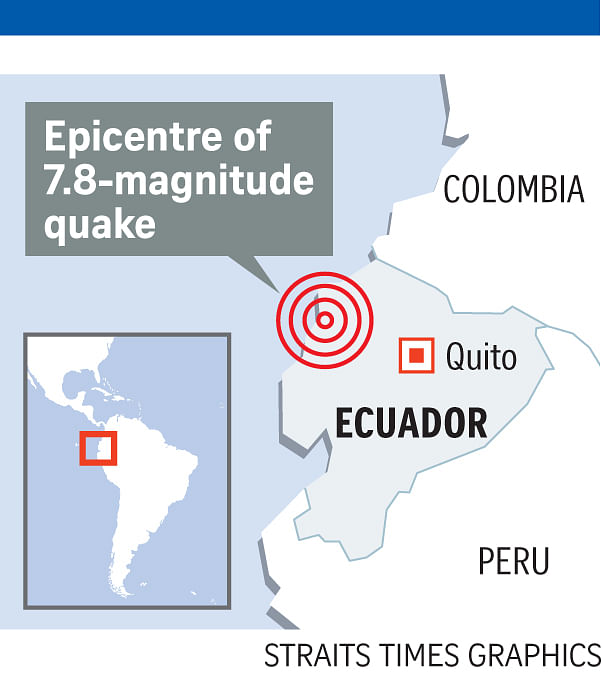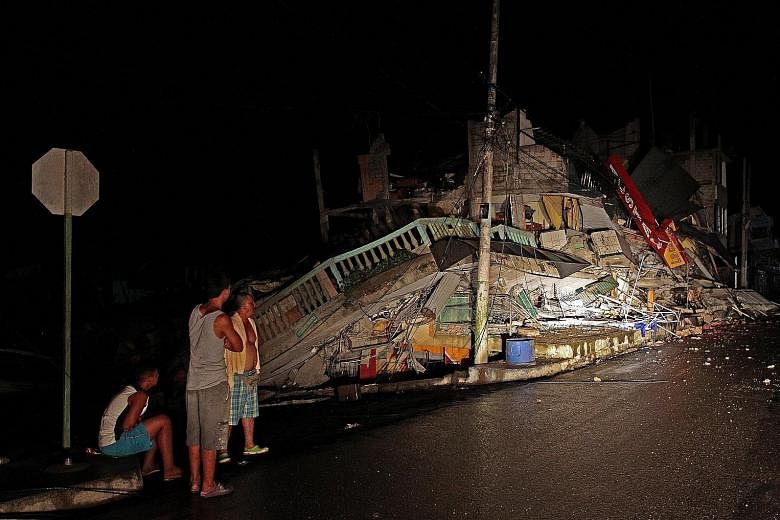GUAYAQUIL • Ecuador's strongest earthquake in decades killed at least 233 people and injured hundreds more, devastating coastal towns and sending residents fleeing to higher ground.
The 7.8-magnitude earthquake struck off Ecuador's Pacific coast late last Saturday and was felt hundreds of kilometres away in the capital of Quito as well as in the large commercial city of Guayaquil, where rubble lay strewn in the streets and some buildings suffered cracks or partial collapse.
A bridge in the city collapsed on top of a car, crushing it.
The quake was also felt in northern Peru and a large section of southern Colombia, although no casualties were reported.
Ecuador Vice-President Jorge Glas said yesterday that the death toll was likely to rise further, adding that more than 588 people were injured.
At least 55 smaller aftershocks rattled the country after the main quake, Mr Glas said.
A state of emergency has been declared in six provinces.
"It was terrifying. We were all scared and we're still out in the streets because we're worried about aftershocks," said Guayaquil security guard Fernando Garcia. "Everything is damaged."
The western coastal areas nearest the earthquake were the worst affected, including Pedernales, which draws tourists with beaches lined with palm trees, and nearby Cojimies.

"There are villages that are totally devastated," Pedernales Mayor Gabriel Alcivar said in a radio interview. "What happened here in Pedernales is catastrophic."
Mr Ramon Solorzano, 46, a car parts merchant in the city of Manta, said he was getting ready to leave the city with his family.
"Most people are out in the streets with backpacks on, heading for higher ground," he said, speaking in a trembling voice on a WhatsApp phone call. "The streets are cracked. The power is out and phones are down."
President Rafael Correa declared a national emergency and cut short a trip to Italy to return to the Andean country of 16 million people. "Everything can be rebuilt but lives cannot be recovered, and that's what hurts the most," he told Ecuador's state television channel from Rome.
Parts of the capital were without power or telephone services for several hours, but the city government said those services had been restored and there were no reports of casualties in the city.
The government described it as the worst earthquake in the country since 1979, when 600 people were killed and 20,000 injured.
A tsunami warning was lifted last Saturday night but coastal residents were encouraged to seek higher ground in case tides rise.
Social media pictures showed a collapsed bridge in Guayaquil and minor damage to the lobby of a hotel, as well as images of a collapsed control tower at an airport in the city of Manta.
Ms Maria Jaramillo, 36, a resident of Guayaquil, described windows breaking and pieces falling off roofs. "The lights went off in the whole sector and we evacuated... We left barefoot."
State officials said the Opec member's oil production was not affected by the quake but that operations at the principal refinery of Esmeraldas, located near the epicentre, had been halted as a precaution.
Singapore's Ministry of Foreign Affairs said yesterday that it was contacting Singaporeans in Ecuador to ascertain their safety.
Singaporeans who need consular assistance can call the 24-hour MFA Duty Office hotline on 6379-8800/8855.
REUTERS, AGENCE FRANCE-PRESSE

